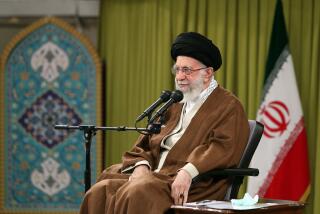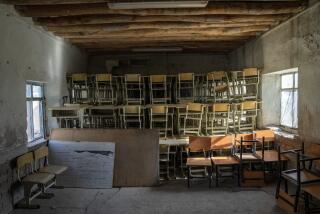For Afghan, reprieve is a 20-year term
- Share via
KABUL, AFGHANISTAN — In a case that has illustrated Afghanistan’s drift toward a more radically conservative brand of Islam as well as the fragility of its legal system, an appeals court Tuesday overturned a death sentence for a student convicted of blasphemy but sentenced him to 20 years in prison.
The student, Parwez Kambakhsh, 24, ran afoul of Afghan authorities last year when he circulated an article about women’s rights under Islam after downloading it from the Internet. He was studying at the time in the northern city of Mazar-i-Sharif, where he also worked as a part-time journalist for local newspapers.
Arrested by security police and initially held without charges, he was eventually tried on blasphemy charges, convicted and sentenced to death.
Tuesday’s ruling by a three-judge appeals court panel was a blow to human rights groups and advocates of press freedom who have championed Kambakhsh’s cause.
International organizations, including New York-based Human Rights Watch, said the case pointed to a troubling lack of respect for freedom of speech and individual liberties in Afghanistan, nearly seven years after a U.S.-led invasion toppled the Taliban fundamentalist Islamic movement.
Brad Adams, the Asia director for Human Rights Watch, called the sentencing “ridiculous” and said it was in some ways a more serious setback than a judicial reaffirmation of the death penalty, on which Afghan President Hamid Karzai would have had to sign off.
“In a way, this is arguably worse for him,” Adams said in a phone interview from New York. “This was an opportunity to undo kangaroo-court justice. . . . It shows Afghanistan is not making progress on anything to do with the judiciary.”
Religious conservatives had welcomed the earlier sentence against Kambakhsh. After the death penalty was handed down at his January trial, public demonstrations were held in support of the decision, and some prominent clerics declared he deserved to be executed for violating the teachings of Islam.
Kambakhsh can still appeal to the Supreme Court, but that will be his final recourse. He has insisted on his innocence.
“I don’t accept the court’s decision,” he told the Associated Press as he left the courtroom after Tuesday’s ruling. “It is an unfair decision.”
Kambakhsh’s supporters have said the case should be thrown out because the previous trial was held in secret and he was denied legal representation, not uncommon occurrences in Afghan courts. Reformers say the case exemplifies the continuing failure of the Afghan government to establish a free and independent judiciary.
Family members have said Kambakhsh was beaten and threatened with death until he signed a confession and that local journalists who expressed support for him were warned they would be arrested if they persisted.
Kambakhsh’s journalist brother, Yaqoub Ibrahimi, has said he believes the blasphemy charges were a pretext and that Ibrahimi was the authorities’ real target because of articles he wrote about abuses by local warlords and militias.
--
More to Read
Sign up for Essential California
The most important California stories and recommendations in your inbox every morning.
You may occasionally receive promotional content from the Los Angeles Times.













